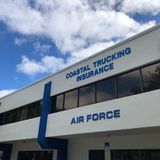Exploring Coastal Trucking Insurance in North Carolina
Operating a trucking business in coastal regions presents unique challenges and risks that demand specialized insurance coverage tailored to coastal environments. In this blog, we delve into the world of coastal trucking insurance in North Carolina, exploring its importance and critical considerations for trucking companies navigating coastal routes. Coastal trucking insurance is essential for mitigating risks associated with inclement weather, saltwater exposure, and unpredictable road conditions.
Trucking businesses operating along North Carolina's coastal routes benefit from comprehensive coverage that protects against property damage, cargo loss, liability claims, and environmental hazards specific to coastal operations. Understanding the nuances of coastal trucking insurance is crucial for ensuring operational continuity and safeguarding assets in challenging coastal environments. Explore how specialized insurance coverage can mitigate risks and provide peace of mind for trucking businesses operating in North Carolina's coastal regions.
Understanding Coastal Trucking Insurance
Coastal trucking insurance is tailored to address the specific needs of trucking businesses operating in coastal regions. It includes comprehensive coverage for liability, cargo, physical damage, and environmental risks associated with coastal operations. This specialized insurance helps mitigate financial losses and protects against unforeseen events unique to coastal trucking.
The Importance of Trucking Insurance in Coastal Areas
Trucking companies operating along North Carolina's coastal routes face distinct challenges, such as inclement weather, unpredictable road conditions, and exposure to saltwater corrosion. Coastal trucking insurance provides essential coverage to protect against these risks and ensure business continuity in challenging environments.
Key Coverage Options for Coastal Trucking Insurance
Liability Coverage: This critical component of coastal trucking insurance shields trucking businesses from financial liabilities arising from bodily injury or property damage resulting from accidents. In coastal areas, where weather-related incidents and road conditions can pose increased risks, liability coverage is essential for protecting against unforeseen accidents and potential legal claims.
Cargo Insurance: Coastal trucking involves transporting goods through varied environments, including exposure to saltwater and adverse weather conditions. Cargo insurance provides coverage for damage or loss of goods during transit, offering financial protection against cargo-related risks specific to coastal routes. This coverage is vital for ensuring that trucking businesses can fulfill their contractual obligations and maintain customer trust.
Physical Damage Coverage: Coastal trucking operations face heightened risks of vehicle damage due to accidents or environmental factors such as saltwater corrosion. Physical damage coverage protects against repair costs for trucks and equipment, ensuring prompt recovery and minimal disruption to operations in coastal environments.
Environmental Protection: Coastal operations can pose environmental risks, including pollution and contamination from spills or accidents. Environmental protection coverage addresses these risks, providing financial support for cleanup costs and liability associated with environmental damage. This coverage is crucial for mitigating the impact of unforeseen ecological incidents and complying with regulatory requirements in coastal regions.
Factors to Consider When Choosing Insurance
When selecting coastal trucking insurance in North Carolina, trucking companies should consider:
Coverage limits and deductibles tailored to their specific operational needs.
Policy exclusions and limitations that may impact coverage.
Compliance with state and federal insurance regulations applicable to coastal trucking.
Benefits of Coastal Trucking Insurance
Coastal trucking insurance offers numerous benefits, including:
Mitigation of financial risks associated with coastal operations.
Protection against cargo damage from saltwater exposure and adverse weather conditions.
Peace of mind knowing that the business is covered against unforeseen events unique to coastal environments.
Navigating Insurance Requirements and Regulations
Trucking companies must navigate state-specific insurance requirements and federal regulations governing coastal trucking operations. Staying informed about insurance laws and compliance obligations is essential to maintaining proper coverage and operational continuity.
Choosing the Right Insurance Provider
Selecting a reputable insurance provider specializing in coastal trucking insurance is crucial. Considerations should include:
Provider's industry expertise and experience in coastal trucking insurance.
Quality of customer service, claims handling, and responsiveness to client needs.
Reputation within the trucking industry and track record of supporting coastal businesses.
Securing Your Coastal Trucking Operations
Coastal trucking insurance in North California is an essential investment for trucking companies operating in North Carolina's coastal regions. By understanding the unique risks and challenges of coastal trucking and selecting the right insurance coverage, businesses can safeguard their operations and ensure resilience in the face of coastal environments. Stay informed, prioritize safety, and partner with a trusted insurance provider to navigate the complexities of coastal trucking with confidence.

.jpg)

.jpg)
Comments
Post a Comment